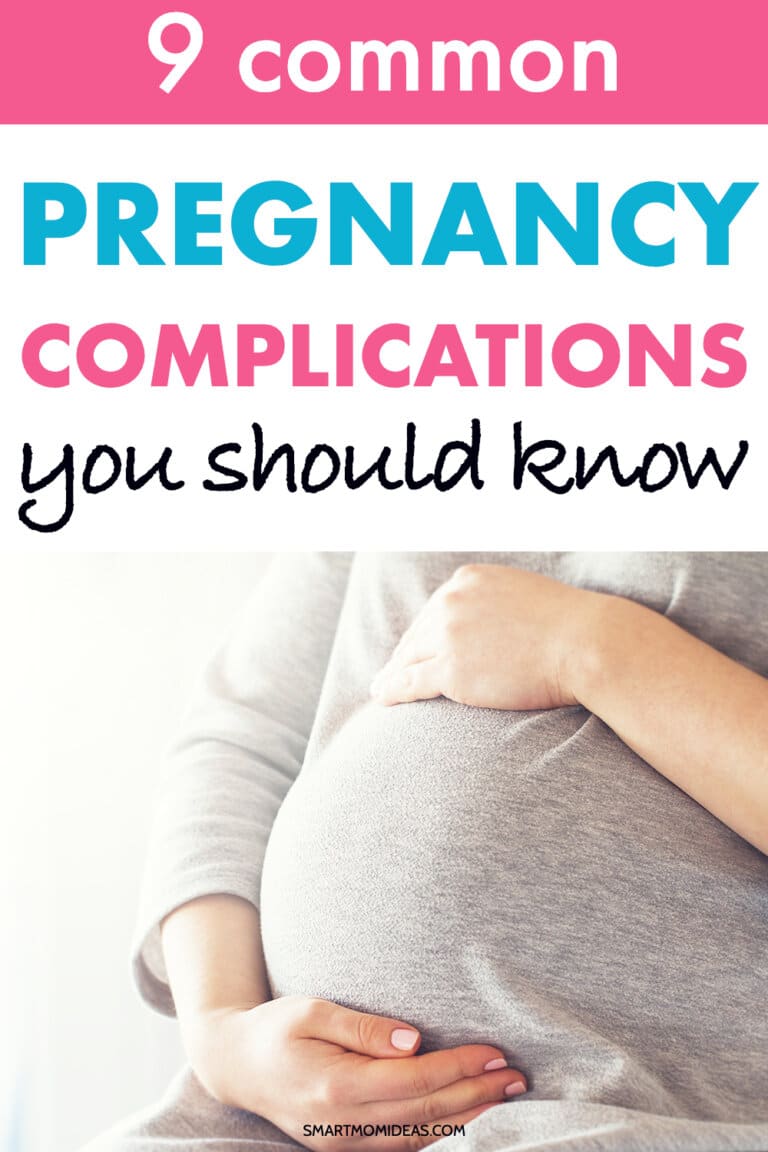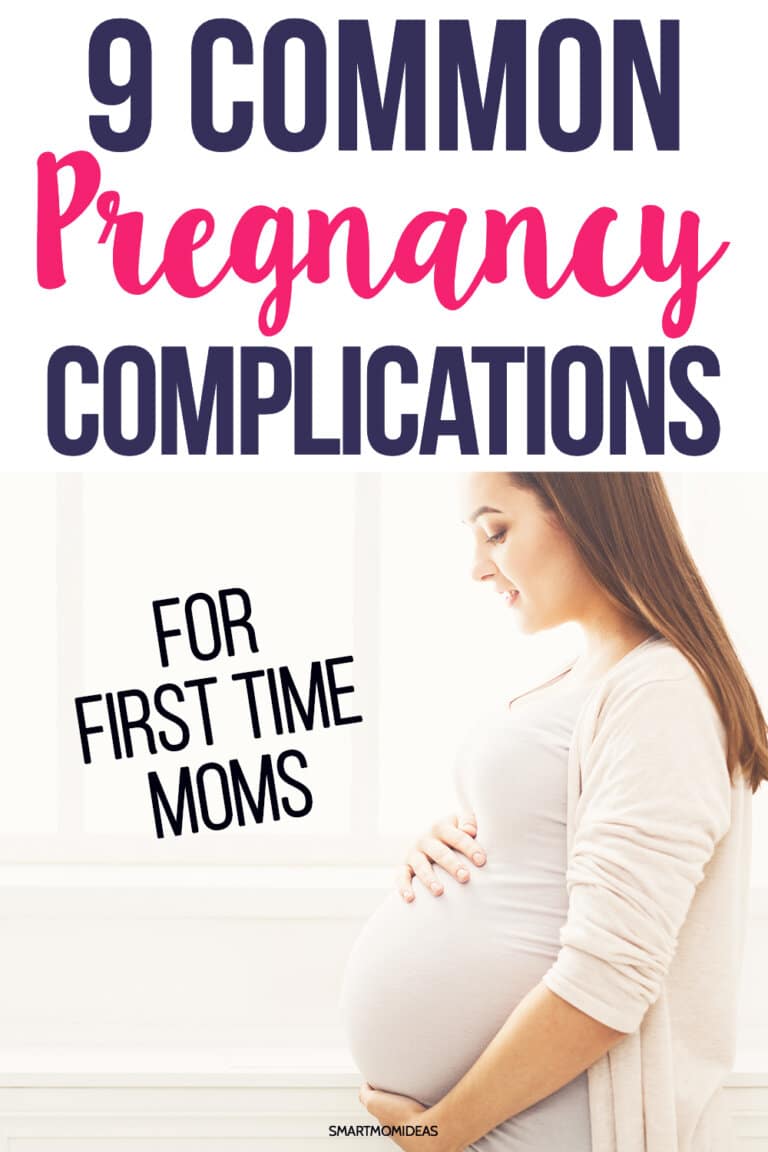Learn nine pregnancy complications so you can be ready.

While it is every woman’s dream to have a complication free pregnancy, that is not always the case.
There are many different things that can happen during pregnancy that can lead to complications, from minor aches and pains to major medical complications.
My twin pregnancy wasn’t without some big complications for me – from getting pregnant to keeping my babies healthy while pregnant.
I developed intrauterine growth restriction and was put on strict bed rest at 23 weeks pregnant.
Fortunately, my c-section went smooth and my twins did not have any complications from my moderate intrauterine growth restriction.
Here are nine of the most common pregnancy complications that women experience.
Sciatica and Lower Back Pain
Pain in the lower back and sciatic nerve is very common in pregnancies. It is more of an annoyance rather than a complication.
Sciatica and lower back pain can last for many months and cause intense amounts of pain.
Pregnant women experience sciatic and lower back pain during pregnancy due to the increase in the hormone relaxin.
Relaxin is a hormone that your body produces in preparation for delivery to help loosen up the muscles and tendons.
While women experience sciatica and lower back pain to varying degrees, it tends to worsen as the pregnancy progresses.
This is due to the size of the baby increasing and more relaxin being released as the delivery date nears.
There are a few things that you can do to help relieve sciatica and lower back pain.
Try to reduce whatever stress you are able to and maintain a good diet and exercise routine.
You can also use hot and cold compresses to alleviate pain or use a pregnancy pillow. If you do a lot of sitting throughout the day, try using an ergonomic seat cushion to relieve back pain.
The good news is that after delivery most of the pain should disappear.
Vaginal Pain
Vaginal pain is also a very common complication that women experience during pregnancy.
There are a lot of things that happen during pregnancy that people often don’t talk about.
Vaginal pain, or lightning crotch, is one of them. While you might have that one friend that likes to share ALL of the gory details of her entire pregnancy and labor, most often, the embarrassing bits get left out.
But thankfully, that is what we are here for. To share all of the gross, embarrassing, or unexpected moments during your pregnancy and motherhood that you might not think to ask about.
Women experience pain in the vaginal area for many reasons.
- When the baby moves into position for birth.
- Hormonal levels changing during pregnancy.
- Nerve pain and the baby moving around.
- Low levels of magnesium.
While, depending on how far along the mother is, these vaginal pains could be mistaken for labor pains.
However, vaginal pain does not always indicate signs of labor. If you are experiencing intense pain, bleeding, or any type of abnormal discharge, you should contact your doctor as this could be a sign of something more serious.
Miscarriage
Unfortunately, miscarriage happens, most often it has nothing to do with what the mother did or did not do.
Miscarriage is not something that pregnant women want to think about, but need to be aware of.
If you start to experience abnormal bleeding (more than spotting) you should see your doctor as this might indicate the onset of a miscarriage.
There is nothing you can do to stop a miscarriage once it has started.
Either the fetus will pass on its own or you will need to have a D & C procedure done, also known as a dilation and curettage.
This is where the cervix is dilated and a spoon shaped instrument (the curettage) is used to scrape out the lining of the uterus to remove the fetus and any remaining tissue.
There are many different risk factors that can contribute to the onset of a miscarriage. This can include the mother’s age, medical background, and other high-risk factors.
How much morning sickness you experience can also indicate if you have a higher chance of experiencing a miscarriage.
The more morning sickness you experience, the more HCG (human chorionic gonadotropin) your body produces, the less likely you are to experience a miscarriage.
Down’s Syndrome and Other Genetic Disorders
As with other health factors that could lead to complications during pregnancy, they can also contribute to down’s syndrome or other genetic disorders.
While there are a few common genetic tests that your OB-GYN might perform, if you fall into certain categories, you will likely require additional genetic testing.
If the mother is 35 years of age or older, she is at a higher risk of having a baby with down’s syndrome.
Furthermore, if the mother is carrying multiples, has had a previous pregnancy or a child with a genetic disorder, or has any family history of genetic disorders, additional testing may be necessary.
Unfortunately there is not much that you can do once the baby has been diagnosed with a genetic disorder.
There are a few things that you can do to protect against genetic disorder.
Before getting pregnant you should be aware of your risk factors. You should also maintain a healthy diet and weight throughout the pregnancy and avoid harmful substances, such as drugs and alcohol.
Preeclampsia
Preeclampsia is commonly associated with high blood pressure in expectant mothers.
High blood pressure during pregnancy is often a side effect of preeclampsia, which also presents in swelling of the hands and feet, dizziness, headaches, stomach pain, protein in the urine, and blurred vision.
At each one of your prenatal visits your doctor will check your blood pressure and your urine sample to check for proteins and to ensure that your blood pressure is in a normal range.
There are multiple factors that can lead to increased risks of preeclampsia, such as chronic hypertension, multiple partners, obesity, in vitro fertilization, and or a pregnancy with multiples.
If preeclampsia is caught early it can easily be treated.
However, if it progresses untreated, it can become severe enough to affect the mother’s organs. The best treatment for preeclampsia is to deliver the baby. Having preeclampsia can also result in fetal distress and result in having a c-section.
Preeclampsia can also be managed with high blood pressure medications, bedrest, or hospitalization if necessary to monitor mother and baby.
Gestational Diabetes
Gestational diabetes is not uncommon. On average 10% of expectant mothers experience this pregnancy complication.
Gestational diabetes is indicated by high levels of sugar in the blood and can manifest itself as fatigue, hunger, and extreme thirst.
Generally, expectant mothers can easily control and even avoid this complication with a healthy diet and exercise. Some women might need to regularly monitor their sugar levels while pregnant if they are at risk for developing gestational diabetes.
In more severe cases of gestational diabetes, the mother may be required to take insulin. If a mother developed gestational diabetes during pregnancy, she might need to continue to have her blood sugar levels tested after the baby is born to ensure she does not develop type 2 diabetes.
At your first prenatal appointment, your doctor will check your glucose levels to see if you are at risk for developing gestational diabetes.
It is very important if you are making a birth plan that you indicate any medical issues you have so that everyone included in your birth plan is aware of how to handle any complications.
Gestational diabetes can also lead to other pregnancy complications, such as a larger baby, having a c-section, high blood pressure or preeclampsia, or low blood sugar.
Placenta Previa
Placenta previa is where the placenta is blocking the baby being able to effectively come out of the vaginal canal. This complication is not uncommon and happens in about 1 in every 200 pregnancies.
There are three different types of placenta previa, complete, partial, and marginal.
Both the complete and partial will require having a c-section, while the marginal can often still result in a vaginal delivery.
Placenta previa is diagnosed via ultrasound, most often in the second trimester.
Symptoms often include bright red bleeding during the second trimester, contractions (that are not false contractions), and the baby being breeched.
Premature Labor and Birth
Did you know that about 25% of babies are born on their due dates?
That means as many as 15 million babies are born preterm, or before 37 weeks of gestation and the remainder are born after their due dates. Technically, preterm labor happens when the expectant mother starts to experience contractions between 20 and 37 weeks of gestation and the cervix begins to open up.
Often times, preterm labor can results in a preterm birth, otherwise known as a preemie baby.
The earlier in the gestational period that the preterm labor happens, the greater the chances of the baby having health issues and needing to spend time in the neonatal intensive care unit.
Ectopic Pregnancy
An ectopic pregnancy, also known as tubal pregnancy, is when a fertilized egg gets implanted outside the uterus, generally in the fallopian tube. An ectopic pregnancy can be fatal to the mother and the implanted fetus needs to be removed via surgical procedure.
There are some instances where the fetus can be transferred to the uterus to continue to be fully developed.
One of the earliest warning signs of an ectopic pregnancy is pelvic pain and light vaginal bleeding.
If the pregnancy progresses with the fetus growing in the fallopian tube, the tube could rupture causing hemorrhaging, fainting, lightheadedness, and even shock.
The onset of light bleeding could be a warning sign of an ectopic pregnancy or implantation bleeding.
Ectopic pregnancies can happen when the fallopian tube is misshapen, inflamed, or damaged in some way.
Women who use an IUD for birth control, smoke, have had fertility treatments, or any kind of tubal surgery are more likely to experience an ectopic pregnancy.
While there is no surefire way to prevent an ectopic pregnancy, you can reduce your risk by not smoking, reducing the number of sexual partners, and always using a condom to reduce any chance of sexually transmitted diseases.
While there are many different complications that can happen during a pregnancy, there are things that you can do to give yourself the best odds.
Maintain a healthy diet with nutrient rich, whole foods, start or continue a workout routine, give up harmful substances, and get the proper prenatal care.
Pregnancy Complications You Should Know
There you go. The nine pregnancy complications that you should know when you are pregnant.
Share in the comments any other pregnancy complications I missed!
Please pin me!





Leave a Reply